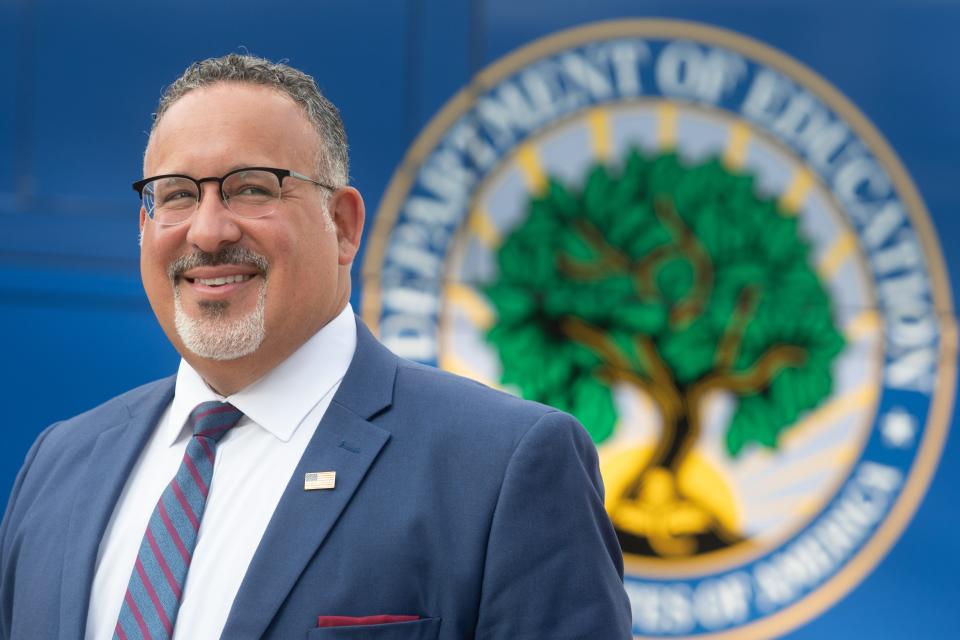35,000 Kansans are benefiting from SAVE, Joe Biden's newest federal student debt program
- Oops!Something went wrong.Please try again later.
After the U.S. Supreme Court struck down President Joe Biden's student debt forgiveness plan, a separate income-driven repayment plan is now open to borrowers while the White House continues to pursue debt forgiveness through a separate legal authority.
But far fewer Kansans stand to benefit from the new federal program.
The White House announced Tuesday that 35,000 Kansas borrowers have enrolled in the new Saving on A Valuable Education, or SAVE, income-driven repayment plan. Additional Kansans may be eligible for the program, and borrowers can apply online at StudentAid.gov/SAVE.
More than 360,000 Kansans stood to receive up to $5.8 billion in benefits from the prior student debt forgiveness plan, the White House previously said. That plan was struck down by the high court in June. The SAVE plan, which has been in the works for about a year, is being pursued under a separate authority from the debt forgiveness plan.
In a news release, U.S. secretary of education Miguel Cardona called SAVE "the most affordable student loan repayment plan in history."

"We're not just lowering payments for today's borrowers," said Education Department undersecretary James Kvaal during a Tuesday news call with reporters. "We're helping their families, their communities, the economy and we're making it possible to pay for college for millions of future students. So this is really about making the American dream more attainable."
More than 4 million borrowers nationwide have enrolled in SAVE, thanks in large part to transitioning people from the Revised-Pay-As-You-Earn plan, or REPAYE. The White House estimates that more than 20 million Americans could benefit.
SAVE plan will help lower-income people with student loans
The SAVE plan is designed to be most beneficial to lower-income borrowers and those with families, and people with higher incomes or who don't have children may not see as much benefit, if any.
"The SAVE plan is an income-driven repayment plan, which means the monthly payments are set based upon your income," Kvaal said. "You do not have to make the payments if you earn less than about $15 an hour, or more if you support a family. And that's because we believe that student loans shouldn't push you deeper into poverty or come before basic living expenses. Above that level, you are asked to pay an affordable percentage of your income."
Bharat Ramamurti, deputy director of the National Economic Council, said a typical borrower with student debt is projected to save more than $1,000 a year compared to other plans.
"The SAVE plan also ensures that if you're making payments, you will not go deeper into debt," Kvaal said. "That is one problem we hear from a lot of borrowers today, that due to unpaid interest they owe more than they originally borrowed. And at the end of the repayment term, any remaining balance is forgiven if your income was not sufficient to pay off the loan."
SAVE plan could see political, legal challenges
But some congressional Republicans are taking issue with the program, with Congressional Review Act resolutions filed in the House and Senate seeking to overturn Biden's plan.
U.S. Sen. Roger Marshall, R-Kansas, was one of 17 Senate Republicans to sign onto a statement that called Biden's plan "reckless" with a cost to taxpayers of as much as $559 billion. U.S. Reps. Lisa McClain, R-Michigan, and Virginia Foxx, R-North Carolina, who introduced the House version, said the Biden administration action is illegal and "a desperate effort to curry favor and buy votes ahead of the next election."
Kvaal and Ramamurti said the Education Department is highly confident in its legal authority to create the SAVE program. Ramamurti said that, to his knowledge, there are no legal challenges against the plan.
Former Kansas Attorney General Derek Schmidt got involved in the federal lawsuit challenging the debt relief plan's constitutionality, and current Attorney General Kris Kobach spoke against it on the campaign trail last fall.
"We are reviewing it," said Danedri Herbert, a spokesperson for the attorney general's office.
Jason Alatidd is a statehouse reporter for the Topeka Capital-Journal. He can be reached by email at jalatidd@gannett.com. Follow him on Twitter @Jason_Alatidd.
This article originally appeared on Topeka Capital-Journal: SAVE student loan plan benefits fewer Kansans than debt forgiveness

